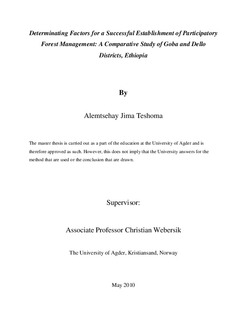| dc.description.abstract | A Participatory Forest Management project run by Farm Africa and SOS Sahel Ethiopia in Bale
region is operational since 2006 in four pilot districts (Goba, Dello, Harrana and Nenesebo). The
establishment of the project has turned out to be a success in some sites and a failure in others.
The objective of this study was to explore factors that explain successful establishment of the
programme thereby assessing the effects of economic, social and biophysical factors on
participation. Data were collected from 80 household respondents as well as from interviewees
and focus group discussions from different sampling units/groups as well as secondary
documents. Descriptive statistical tools such as two-sample t test, Pearson chi-square test and
correlation coefficient were worked out to determine the relationship between variables. A
logistic regression model was used to determine the relative importance of variables. From the
economic factors, annual income, income from forest, and understanding the aim of the
livelihood diversification programme were found to have a significant effect on participation.
The two social variables used in this study perception/understanding about the Community
Based Organization and household size are insignificant in their power to influence household
decision on participation. From the biophysical factors, hamlet, a place where the respondents
reside, is found to have a strong power to explain community decisions to participate in
Participatory Forest Management. The remaining biophysical factors, namely distance from
market and distance from forest have insignificant effect on the decision whether to participate or
not. From this study in general, we can infer that increasing income (it could be forest income or
total income) and changing residence of the society can increase the likelihood of household
participation in PFM.
Key Words: Community Forestry, Deforestation, Livelihoods, Sustainable Development,
Participation, Forest Management, Bale Zone, Ethiopia | en_US |
